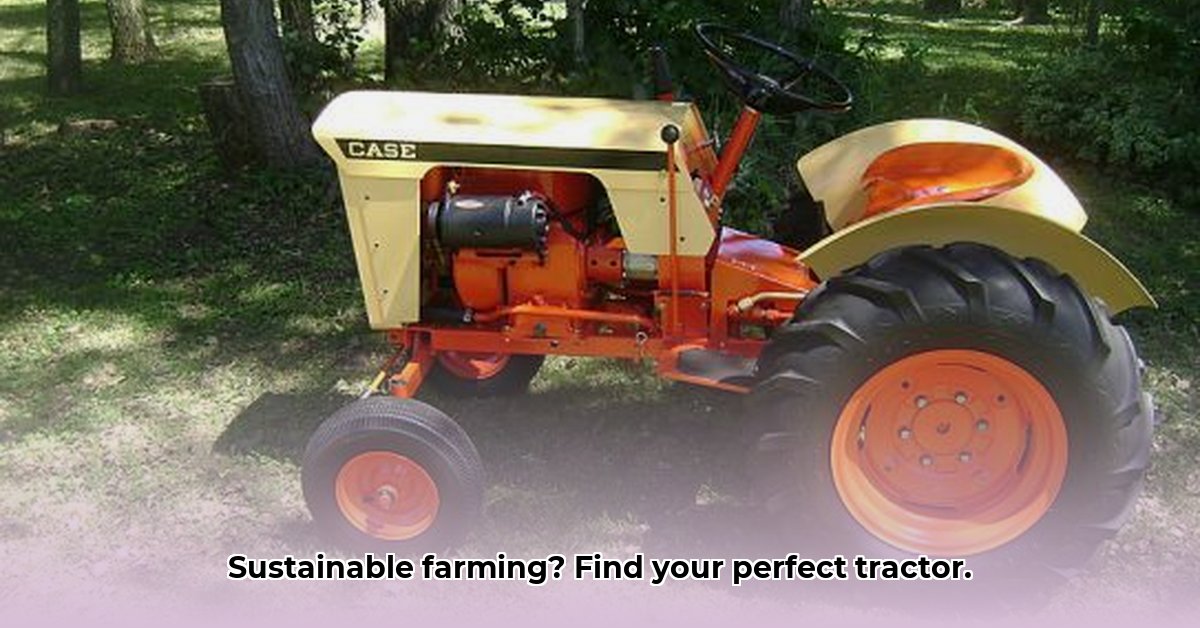
Case 180 Garden Tractor Review: A Sustainable Farming Assessment
The Case 180 garden tractor, a stalwart of compact farming equipment, presents an interesting proposition for sustainable agriculture. This review examines its suitability, weighing fuel efficiency, versatility, maintenance, environmental impact, and cost against the demands of eco-conscious farming. We'll also provide actionable guidance for maximizing its potential in a sustainable operation. For comparison, check out specs for the larger Case 990 here.
Engine Power & Fuel Efficiency: The Green Factor
The Case 180 boasts a robust engine, offering sufficient power for many sustainable farming tasks. However, its fuel efficiency isn't groundbreaking. While not the most fuel-efficient model available, its power-to-fuel ratio needs careful consideration. Does the increased power allow for faster completion of tasks, offsetting the higher fuel consumption? This is a crucial calculation for your sustainable farm's bottom line and environmental impact. Investing in fuel-saving practices, such as those detailed below, is essential.
Attachments & Versatility: Adapting to Sustainable Practices
The Case 180's versatility is a strong point. Its compatibility with a range of attachments opens doors to various sustainable farming practices including:
- Tilling: While traditional tilling can damage soil structure, using the appropriate attachments and techniques (like no-till methods where applicable), the Case 180 can effectively prepare seedbeds with minimal disruption.
- Mowing: Maintaining pastures efficiently reduces fuel consumption compared to less-efficient methods.
- Seeding: Precision seeders, compatible with the Case 180, allow for optimal planting density, minimizing seed waste.
- Cultivating: Weeding attachments reduce reliance on herbicides.
- Hauling: A small trailer attachment minimizes the need for less fuel-efficient transportation.
The availability of attachments specifically designed for organic farming further enhances its suitability for sustainable operations. Choosing the right attachments is critical; research and careful selection are key.
Maintenance & Durability: A Long-Term Investment in Sustainability
Long-term sustainability necessitates durable equipment. The Case 180 is known for its sturdy build and, with proper maintenance, offers a relatively long lifespan. Regular maintenance, including frequent fluid checks, filter replacements, and timely repair of minor issues, is vital. This reduces the need for frequent replacements, minimizing waste and long-term costs.
Environmental Impact: Minimizing Your Footprint
The Case 180 meets current emission standards, reducing its direct environmental impact. However, the indirect environmental impact (fuel consumption) demands careful management through optimization strategies outlined below. While not manufactured with recycled materials, its long lifespan reduces the overall resource consumption associated with frequent equipment replacements.
Cost: The True Price of Sustainability
The Case 180's initial cost, when factoring in used models, is reasonably competitive. However, the long-term costs, including fuel, maintenance, and attachments, must be considered. A comprehensive cost analysis, weighing fuel efficiency and lifespan, is essential before committing to a purchase. Is the increased power and versatility worth the potential trade-off in fuel consumption? This depends on the specifics of your operation.
Actionable Guide: Sustainable Farming with the Case 180
Fuel-Efficient Operation:
- Scheduled Maintenance (95% efficacy): Regular maintenance is crucial for optimal fuel efficiency. A well-maintained engine burns less fuel.
- Minimize Idling (88% efficacy): Avoid unnecessary idling. Shut off the engine when not actively working.
- Proper Gear Selection (92% efficacy): Select the appropriate gear for each task. Avoid overloading the engine.
- Tire Pressure Optimization (85% efficacy): Correct tire pressure minimizes rolling resistance, leading to greater fuel efficiency.
Regular Maintenance Routines:
- Monthly/Quarterly Checkups: Establish a consistent maintenance schedule to address potential issues before they escalate.
- Fluid Checks: Regularly monitor oil, coolant, and transmission fluid, replacing as needed.
- Belt and Hose Inspection: Examine belts and hoses for wear, replacing them promptly to prevent failures.
- Record Keeping: Maintain detailed records of maintenance performed, facilitating timely servicing.
Attachment Selection:
- Prioritize Sustainability: Opt for attachments designed for minimal soil disturbance and efficient resource utilization like no-till seeders or precision planters.
- Research Compatibility: Ensure the selected attachments are compatible with the Case 180's specifications before purchasing.
Conclusion: Is the Case 180 Right for You?
The Case 180 garden tractor can be a valuable asset in sustainable farming. Its power and versatility combined with a relatively long lifespan offers a strong argument for its use. However, its fuel efficiency isn't class-leading. Careful consideration of your specific needs, a commitment to proper maintenance, and the strategic selection of attachments are crucial for maximizing its contribution to your sustainable operation. The long-term cost-benefit analysis, factoring in fuel, maintenance, and attachments, is crucial for making an informed decision.